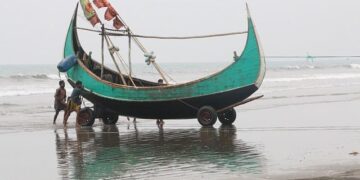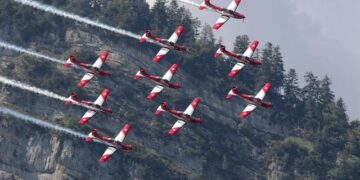In a significant development that heightens tensions in global military relations, Russian Deputy Chairman of the Security Council, Dmitry Medvedev, has issued a stern warning amid Moscow’s announcement that it no longer considers itself bound by the Intermediate-Range Nuclear Forces (INF) Treaty. This pivotal shift comes in the wake of escalating geopolitical friction, as Russia grapples with mounting pressures from the West. Medvedev’s remarks signal a potential return to an arms race reminiscent of the Cold War era, raising concerns among international observers about the implications for regional and global security. As the world watches closely, the unfolding situation poses critical questions about arms control and the future of diplomatic relations between Russia and NATO countries.
Russia’s New Stance on Missile Treaties Signals Escalating Tensions in Global Arms Control
In a dramatic shift, Russia has announced its withdrawal from key missile treaties, further complicating the already fraught global arms control landscape. Dmitry Medvedev, the former president and now deputy chairman of the Security Council, issued a stark warning regarding the implications of this decision, suggesting that Moscow no longer sees itself bound by the terms that governed its missile capabilities. This move has raised alarms among international security experts, as it highlights Russia’s readiness to bolster its military arsenal and potentially deploy new offensive systems, exacerbating tensions with NATO member states and other global powers. Analysts are concerned that such actions could spark a new arms race reminiscent of the Cold War era.
The repercussions of Russia’s stance could be significant and far-reaching, including:
- Increased Military Spending: A potential boost in defense budgets across NATO countries in response to perceived threats.
- Destabilization of Regional Security: Heightened tension in sensitive areas such as Eastern Europe and the Arctic.
- Diplomatic Strain: Further deterioration of already fragile diplomatic relations between Russia and the West.
The global community is now left grappling with how to address these developments. As countries reassess their defense strategies, the future of international arms treaties hangs in the balance, raising questions about the effectiveness of current frameworks designed to prevent the proliferation of missile technology and maintain collective security.
Medvedev’s Warning Highlights Growing Risks of Military Confrontation in Europe
Former Russian President Dmitry Medvedev’s recent comments underscore a significant shift in the geopolitical landscape of Europe, signaling an escalated possibility of military tensions. As Moscow announced its withdrawal from key missile treaties, Medvedev articulated a stark warning about the implications of NATO’s expansion, emphasizing the potential for a renewed arms race. Analysts are now considering the ramifications of this decision not only for Russia but also for its European neighbors, who may find themselves at heightened risk given the deteriorating security environment.
A growing concern among NATO member states revolves around the following factors:
- Increased Military Presence: Russia’s military buildup near its western borders suggests a readiness for escalation.
- Alliances Shifting: Nations previously perceived as neutral may now align more closely with NATO as a response to perceived threats.
- Diplomatic Tension: Diplomatic avenues seem increasingly futile as rhetoric hardens on both sides.
The current situation prompts a reevaluation of existing defense strategies, as European powers brace for a potentially volatile future. In light of these developments, various defense analysts are calling for:
- Enhanced Military Coordination: Greater collaboration among allies to ensure deterrence against potential aggression.
- Revival of Diplomacy: Urgent needs for dialogue to address misunderstandings and avoid miscalculations.
Strategic Recommendations for International Diplomacy Amidst Heightened Russian Threats
As tensions escalate due to Russia’s recent withdrawal from key missile treaties, international actors must adopt a multifaceted approach to diplomacy that emphasizes communication, cooperation, and strategic deterrence. The following actions are recommended for nations and organizations navigating the precarious landscape of Russian foreign policy:
- Strengthen Alliances: Reinforce existing alliances such as NATO to create a unified front against aggression, ensuring member states are aligned on common security goals.
- Engage in Open Dialogues: Facilitate continuous dialogue with Moscow to mitigate misunderstandings and reduce the risk of rapid escalation.
- Enhance Defense Capabilities: Invest in advanced defense systems and technological innovations to deter potential Russian threats without provoking further escalation.
- Promote Regional Stability: Work collaboratively with Eastern European nations to foster stability and counterbalance Russian influence.
Additionally, a proactive approach to sanctions and economic responses is critical. The table below outlines potential sectors that could be targeted to exert pressure on the Russian economy while minimizing global disruption:
| Sector | Proposed Action |
|---|---|
| Energy | Limit imports and target Russian oil exports with escalated sanctions. |
| Finance | Increase restrictions on Russian banks and financial institutions. |
| Technology | Restrict access to advanced technologies and dual-use items. |
| Military | Enhance trade embargoes on arms and military equipment. |
To Wrap It Up
In conclusion, the recent statements from Dmitry Medvedev and the Russian government signal a significant shift in the landscape of international arms control. As Moscow asserts that it no longer feels bound by the key missile treaty, the implications for global security are profound. The potential escalation in missile capabilities raises alarms not only for Europe but for the broader international community. As the situation unfolds, the focus will remain on how other nations respond to this development and whether diplomatic channels can be reactivated to mitigate rising tensions. The world watches closely as these geopolitical dynamics continue to evolve, with stability hanging in the balance.














